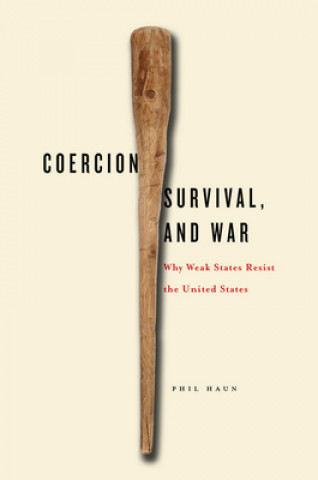
Kód: 09235708
Coercion, Survival, and War
Autor Phil M Haun
In asymmetric interstate conflicts, great powers have the capability to coerce weak states by threatening their survival--but not vice versa. It is therefore the great power that decides whether to escalate a conflict into a crisi ... celý popis
- Jazyk:
 Angličtina
Angličtina - Väzba: Pevná
- Počet strán: 288
Nakladateľ: Stanford University Press, 2015
- Viac informácií o knihe

47.30 €

Skladom u dodávateľa v malom množstve
Odosielame za 12 - 17 dní
Potrebujete viac kusov?Ak máte záujem o viac kusov, preverte, prosím, najprv dostupnosť titulu na našej zákazníckej podpore.
Pridať medzi želanie
Mohlo by sa vám tiež páčiť
-

Gasp!
20.37 € -

Building Bridges
78.02 € -

Heaven Knows Why
28.97 € -3 % -

Behavior of Pipe Piles in Sand
206.24 € -

Crash Course Cardiovascular System Updated Print + E-Book Edition
38.60 € -

GodThe World's Future
55.60 € -

Chipfertigung
15.56 €
Darujte túto knihu ešte dnes
- Objednajte knihu a vyberte Zaslať ako darček.
- Obratom obdržíte darovací poukaz na knihu, ktorý môžete ihneď odovzdať obdarovanému.
- Knihu zašleme na adresu obdarovaného, o nič sa nestaráte.
Viac informácií o knihe Coercion, Survival, and War
Nákupom získate 117 bodov
 Anotácia knihy
Anotácia knihy
In asymmetric interstate conflicts, great powers have the capability to coerce weak states by threatening their survival--but not vice versa. It is therefore the great power that decides whether to escalate a conflict into a crisis by adopting a coercive strategy. In practice, however, the coercive strategies of the U.S. have frequently failed. In "Coercion, Survival and War" Phil Haun chronicles 30 asymmetric interstate crises involving the US from 1918 to 2003. The U.S. chose coercive strategies in 23 of these cases, but coercion failed half of the time: most often because the more powerful U.S. made demands that threatened the very survival of the weak state, causing it to resist as long as it had the means to do so. It is an unfortunate paradox Haun notes that, where the U.S. may prefer brute force to coercion, these power asymmetries may well lead it to first attempt coercive strategies that are expected to fail in order to justify the war it desires. He concludes that, when coercion is preferred to brute force there are clear limits as to what can be demanded. In such cases, he suggests, U.S. policymakers can improve the chances of success by matching appropriate threats to demands, by including other great powers in the coercive process, and by reducing a weak state leader's reputational costs by giving him or her face saving options.
 Parametre knihy
Parametre knihy
Zaradenie knihy Knihy po anglicky Society & social sciences Politics & government
47.30 €
- Celý názov: Coercion, Survival, and War
- Podnázov: Why Weak States Resist the United States
- Autor: Phil M Haun
- Jazyk:
 Angličtina
Angličtina - Väzba: Pevná
- Počet strán: 288
- EAN: 9780804792837
- ISBN: 0804792836
- ID: 09235708
- Nakladateľ: Stanford University Press
- Hmotnosť: 578 g
- Rozmery: 229 × 159 × 25 mm
- Dátum vydania: 01. July 2015
Obľúbené z iného súdka
-

Case Against the Sexual Revolution
16.89 € -21 % -

Wretched of the Earth
10.64 € -18 % -

The Trigger
25.28 € -18 % -

State and Revolution
5.31 € -13 % -

Accidental Superpower
18.42 € -19 % -

My Autobiography
13.20 € -18 % -

Fight Like A Girl
12.28 € -15 % -

Against Civilization
16.58 € -4 % -

The Lords of Poverty: The Power, Prestige, and Corruption of the International Aid Business
13.92 € -19 % -

Politics
52.63 € -5 % -

Cold and the Dark
20.16 € -13 % -

Voices from the Contemporary Japanese Feminist Movement
56.93 € -
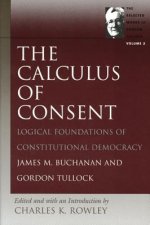
Calculus of Consent
17.09 € -

Mafia Monograph, Part 1 of 4
22.52 € -

Israel Lobby and U. S. Foreign Policy
28.77 € -7 % -

Harm Reduction or Harm Maintenance
32.97 € -

Entropy Of Capitalism
47.30 € -

Red Petrograd
24.06 € -

Troubled Constitutional Future
28.66 € -

Lineages of Modernity - A History of Humanity from the Stone Age to Homo Americanus
46.79 € -

Inventing Vietnam
32.45 € -29 % -

City of Quartz
15.97 € -15 % -

Flash Boys - A Wall Street Revolt
12.89 € -
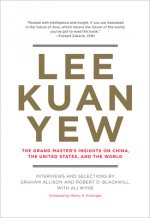
Lee Kuan Yew
22.01 € -6 % -

Giants
19.96 € -13 % -

Children of the Matrix
18.32 € -15 % -

Queer Encounters with Communist Power
25.80 € -

Identity
11.36 € -24 % -
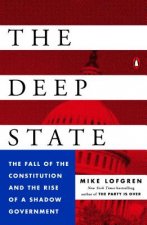
Deep State
16.17 € -21 % -

Next Decade
17.91 € -22 % -

Return of Marco Polo's World
15.25 € -19 % -

Force of Reason
20.98 € -2 % -

STRANGE DEATH OF EUROPE
20.16 € -6 % -

Political Science For Dummies
19.34 € -20 % -

Yoga of Eating
12.38 € -18 % -
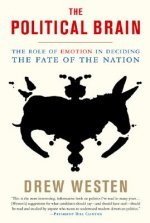
Political Brain
15.35 € -21 % -

GREEN BOOK
7.88 € -23 % -

Politics: A Very Short Introduction
10.13 € -22 % -

Out of the Wreckage
20.88 € -20 % -

No Turning Back
12.28 € -23 % -

Urban Warfare in the Twenty-First Century
28.66 € -

Trade Marketing, Category Management, and Shopper Marketing
95.33 € -

Spirit of the Laws
23.95 € -

USAF Military Working Dog Program - Scholar's Choice Edition
30.71 € -

Psychology of Politics
23.34 € -
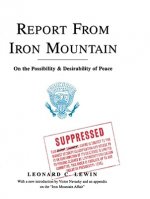
Report From Iron Mountain
15.56 € -

Lies My Teacher Told Me
22.83 € -19 % -

Liberalism and Its Critics
36.14 € -

Scramble for Europe, Young Africa on its way to the Old Continent
19.24 € -21 %
Osobný odber Bratislava a 2642 dalších
Copyright ©2008-24 najlacnejsie-knihy.sk Všetky práva vyhradenéSúkromieCookies


 21 miliónov titulov
21 miliónov titulov Vrátenie do mesiaca
Vrátenie do mesiaca 02/210 210 99 (8-15.30h)
02/210 210 99 (8-15.30h)